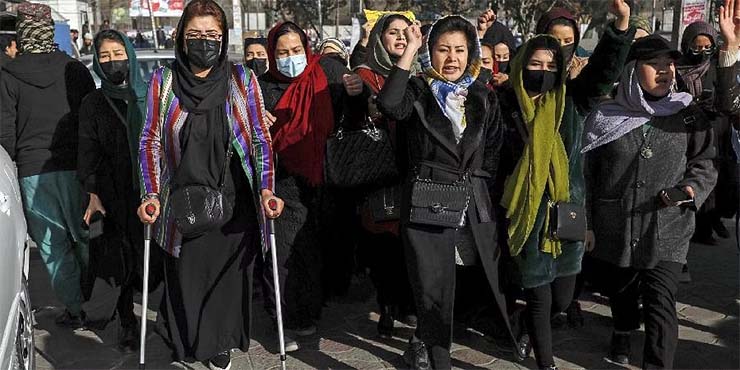
“You educate a man, you educate a man, you educate a woman, and you educate a generation,” said Brigham Young; unfortunately this aphorism is not at all understood by the Taliban. In a recent diktat, the Taliban regime in Afghanistan banned higher education for women and barred entry of women into universities and schools. The Taliban stormed to power in Afghanistan in August 2021 when the last of the US forces left the country.
The Taliban offered moral platitudes to the international community during the signing of the Doha Accord and numerous times after time that it was a changed insurgent group which cared for women’s rights and was very much concerned about the continuation of their education. It signalled to the international community that it was a changed group committed to a more inclusive tolerant version of Islam. However, it all appeared to be a charade.
This, however, doesn’t come as a surprise to the international community, because the ‘new’ Taliban is very much the same wine in the new bottle, 11 out of 15 of its ministers are UN-designated terrorists and even have members from the dreaded Haqqani group in the Afghan cabinet. The Taliban are known for their strict interpretation of Islam- the Wahabbi brand of Islam which doesn’t allow any room from Islam’s pristine form which exemplifies the austere nature of the religion and the crisis that plagues it.
Regressive decision
This decision is regressive, to say the least. At a time when women across the world in any society are making a mark in every field and are matching mighty strides with their male counterparts, this decision is an abomination of that thought. It sets back years of progress made by Afghan society in general and Afghan women in particular regarding their educational progress. While the years of the US occupation were hard and trying yet it at least guaranteed a semblance of normalcy. But all that is undone now.
Women who are educated not only help in social development, but scientific research over the centuries has proven that educated women provide a much-needed labour force and help in increasing the per capita GDP of society. Women’s education has therefore been high on the priority of foreign governments and other international organisations. The Indian government through its ‘Beti Bachao, Beti padhao’ programme has strongly emphasised this issue besides launching a whole host of schemes for the Indian girl child.
This decision of the Taliban regime has undoubtedly evoked universal condemnation, even a country like Saudi Arabia which was once the epicentre of global jihad (at least in the 1970s and 1980s) has made mighty strides, especially under its crown prince and prime minister Mohammed Bin Salman which was perhaps unheard of in the Middle East, even a medieval society like Pakistan prioritises women’s education.
This reprehensible decision will push Afghan society into the dark ages when there was no scope for improvement and forward progression.
India’s stand
India so far hasn’t issued a strong condemnation of this brazen ill-thought decision of the Taliban regime but has expressed strong concern. It is however imperative that the Indian government take immediate steps to deal with the regime:
First, impose economic sanctions on the members of the Taliban regime by imposing assets freeze and travel ban, it should also formally ask the Financial Action Taskforce (FATF) to launch a money laundering investigation into the Taliban government’s assets, especially its covert links with the ISI, the powerful external services agency of the Pakistani state.
Secondly, convene a special session of the UN Security Council in its capacity as the president and draft a resolution which formally condemns the regressive decision of the regime and make a solemn resolve under the UN charter to do what is necessary to protect the rights of Afghan women and restore their education at the earliest possible time.
Lastly, ask Saudi Arabia, which is the ideological godfather of the Taliban, to persuade it to rescind its decision highlighting the immense benefits of an educated Afghan society.
Conclusion
It is imperative that India takes a strong stand on this issue, as the country with the largest female population in the world after China; it is India’s solemn duty to stand with them at this moment of hardship and do its necessary work to ensure that Afghan women are not let down.
– The writer is currently working as a Research Associate at Defence Research and Studies (dras.in) and is a columnist. The views expressed are personal and do not necessarily reflect the views of Raksha Anirveda








